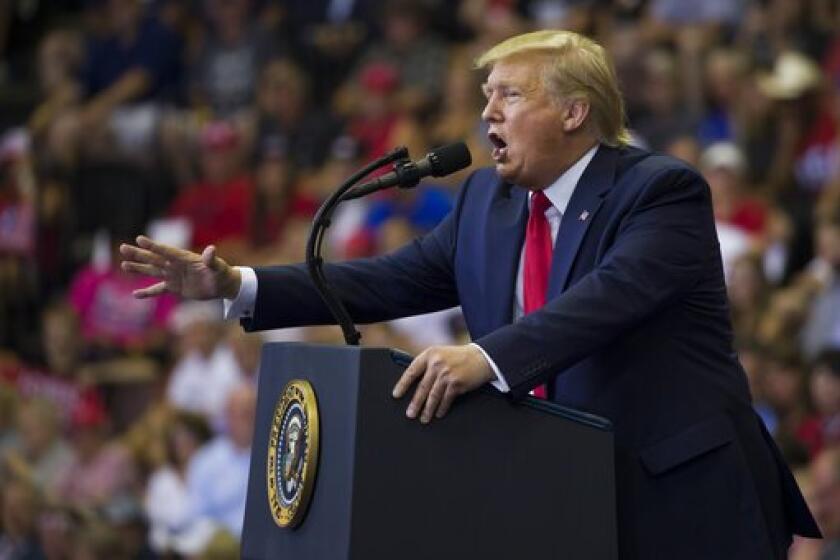House, Senate Vote to Ban U.S. Imports of Iranian Oil
- Share via
WASHINGTON — Both the Senate and House, angered by news that Iran is using American dollars to fund its assault on international shipping in the Persian Gulf, voted overwhelmingly Tuesday to ban all U.S. imports of crude oil and other products from Iran.
The legislation, which will be sent to President Reagan after differences between the House and Senate bill are resolved, would immediately halt all imports from Iran unless the Administration requested a six-month delay. The ban would not be lifted until Iran ends its belligerent acts against shipping in the gulf.
Unlike the Senate version, which passed 93 to 0, the House measure would authorize the President to enter into negotiations with other countries to persuade them to join the embargo. The House bill was adopted 407 to 5.
Proponents of the legislation acknowledged that it would have little or no impact on Iran’s ability to wage war. Nevertheless, it was advocated by Republicans as well as Democrats as a symbolic way to express U.S. opposition to Iranian actions in the gulf.
“It is outrageous to learn that American dollars have been flowing into the Iranian war machine,” said California Rep. Mel Levine (D-Santa Monica), sponsor of the House bill, referring to the payments that Iran receives for its exports.
The Reagan Administration so far has taken no position on the embargo, and Senate Minority Leader Bob Dole (R-Kan.), author of the Senate measure, said he understands that there are some officials in the State Department who oppose the embargo. The legislation is designed to “force the Administration to face the issue squarely,” according to Dole.
“So it is doubly important that the Congress go on record overwhelmingly in favor of an embargo,” Dole said, “and present the question to the Administration in a fashion that it cannot be ducked or bureaucratically swept under the rug.”
Way Around Veto
The Senate last week approved an identical embargo measure as part of a $303-billion defense spending bill for fiscal 1988, but Dole said it was necessary to enact the embargo as a free-standing piece of legislation because Reagan has vowed to veto the defense bill.
The House and Senate bills were drafted in response to the Iranian mining of the Persian Gulf as well as to a recent Commerce Department report indicating that U.S. imports of Iranian oil have increased sharply in recent months.
According to the Commerce Department, the United States imported $819-million worth of Iranian oil in the first seven months of this year, compared to $498 million in all of 1986. In addition to oil, the United States imports rugs, pistachio nuts and some other goods from Iran. Sales to the United States still represent a very small fraction of Iran’s exports.
The import ban would not affect U.S. exports to Iran, mostly low-technology manufactured goods, which totaled about $32 million in 1986.
In representing the Administration during the House Foreign Affairs Committee’s discussion of the bill, Paul Freedenberg, acting Commerce Department under secretary for export administration, expressed skepticism about the bill. He noted that a similar ban imposed on Libya’s oil exports by the Administration has had no impact on that nation.
‘Moral Statement’
An embargo on Iranian imports, he told reporters, “would be more a profound moral statement than an effective cutoff of their exports.”
Likewise, Rep. Lee Hamilton (D-Ind.) said the embargo could damage efforts by an international tribunal in The Hague to settle the $20 billion to $30 billion in outstanding claims between Iran and the United States. He also argued that the import ban might undermine the United States’s claim that it is neutral in the Iran-Iraq War.
U.S. claims against Iran now pending in The Hague stem from the 1979 takeover of Iran by Islamic fundamentalists and the confiscation of plants and facilities owned by U.S. companies. Freedenberg said the Administration is weighing what impact an import ban would have on U.S. claims against Iran.
But California Rep. Leon E. Panetta (D-Monterey) said that the United States cannot continue to help finance Iranian attacks in the gulf, particularly when U.S. servicemen are in danger.
“We ought to do nothing to help those who are attacking our forces,” he said.
Rep. William S. Broomfield (R-Mich.) said that the embargo would deprive the Iranians of the hard cash necessary to buy weapons on the world market.
“It will not cause the war to end, but it will send a strong message,” he said.
More to Read
Get the L.A. Times Politics newsletter
Deeply reported insights into legislation, politics and policy from Sacramento, Washington and beyond. In your inbox twice per week.
You may occasionally receive promotional content from the Los Angeles Times.










